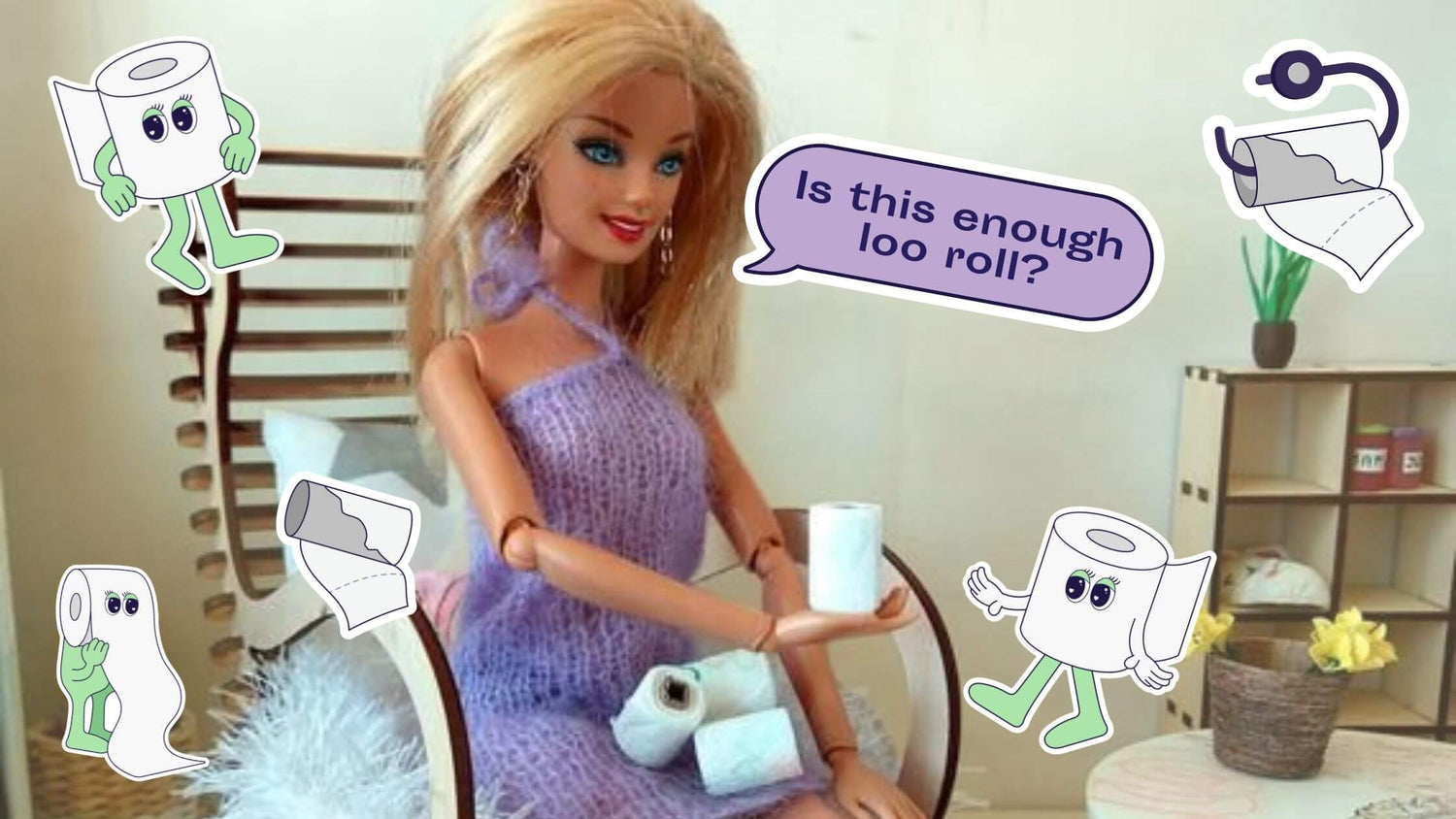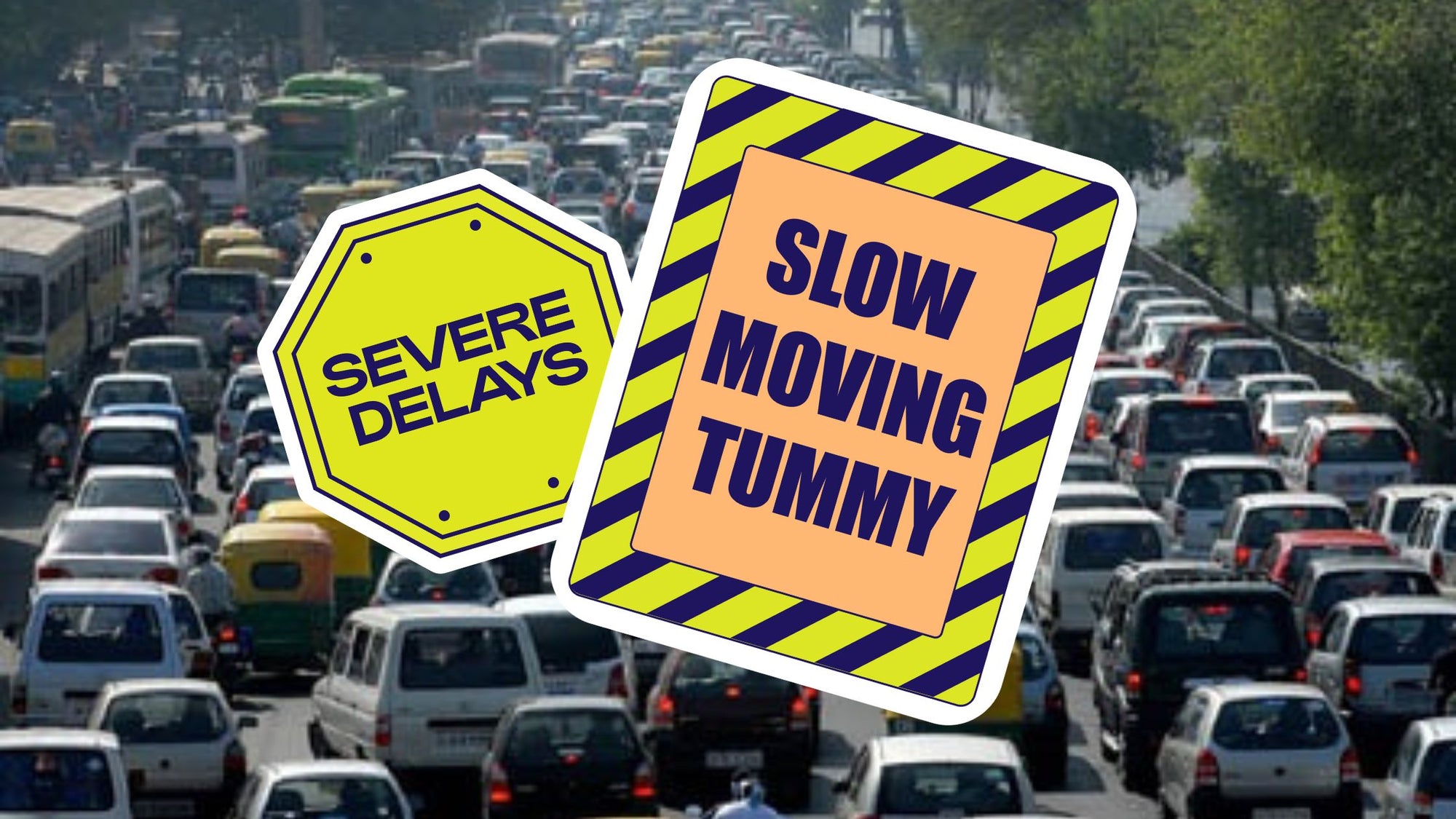Because of this, very few people (women and men alike) are aware of the true impact that female reproductive hormones have on the entire body. They don’t just influence the uterus and ovaries. They work systemically to regulate lots of different things, including digestion.
Yes, believe it or not, the same hormones that cause you to bleed every month are also the reason you might experience lots of digestive issues at certain times of the month. Maybe you bloat or have excess gas, or maybe you experience diarrhoea or constipation around your period. Digestive symptoms are very common in menstruating women, particularly in the week or so leading up to the monthly bleed and during the bleed (menstruation) itself.
In this article, I am going to focus on period constipation, why it happens, and how to relieve constipation naturally.
What Is Period Constipation?
Period constipation is exactly what it sounds like. It is a reduction in bowel movements caused by the hormonal changes associated with the menstrual cycle. Usually, constipation is defined as fewer than three bowel movements a week, but if you usually only go this number of times anyway, you can assume that you’re constipated if you go even less than this.
Many women get constipated in the days leading up to their periods, and usually, this digestive issue resolves after they stop bleeding. The main reason for this constipation is the fluctuations in oestrogen and progesterone during different phases of the menstrual cycle.
The phases of the cycle include the follicular phase, ovulation, and luteal phase. Some textbooks and articles will mention a fourth phase, menstruation. However, some people group menstruation in with the luteal phase.
The follicular phase starts when you finish your period (day 1 of a new cycle) and finishes just before ovulation. Usually, this phase lasts anywhere between nine and 18 days, but the average length of the follicular phase is 14-15 days. During this phase, the levels of oestrogen and progesterone start off very low. They slowly rise towards the end of the phase to prepare the body for ovulation and a potential pregnancy.
Following ovulation, you’ve got the luteal phase, which runs from ovulation to your next cycle. During this phase, oestrogen and progesterone production ramps up significantly and reaches the highest a couple of days before menstruation.
The day before you start bleeding, the levels of oestrogen and progesterone fall rapidly, reaching their lowest points just as you stop bleeding and start a new cycle.
Okay, you might be wondering why I have just spent all of this time talking about the menstrual cycle in detail. How is this relevant to bloating?
Well, both oestrogen and progesterone influence water regulation and fluid balance in the body. Therefore, changes in their levels within the body can change how much water remains in your colon during digestion. When too much water moves out of the colon, it dries out the stool and may lead to constipation.
What Are the Symptoms?
Constipation is technically a symptom itself, and it describes infrequent bowel movements. It leads to hard, dry souls that are difficult to pass.
However, there are several other symptoms that accompany hormonal constipation, including the following:
- Bloating - constipation can cause bloating due to creating a backup of stools in the colon, leading to a feeling of fullness and tightness in the abdomen.
- Fatigue - when you feel full and constipated, you’re more likely to experience fatigue. This tiredness is exacerbated by oestrogen and progesterone, both of which can contribute to general fatigue around your period.
- Loss of appetite - when you feel full, bloated, and unable to pass a bowel movement, it can make you feel like you don’t want to eat. Being constipated often makes it seem as though you have less room for food, and you may subconsciously eat less as a result.
- Abdominal discomfort or pain - many women experience abdominal discomfort, pains, and cramps alongside constipation at certain times in their monthly cycle. This discomfort may worsen with a bowel movement but resolve shortly after.
How Can I Avoid Period Constipation?
If you experience period constipation regularly, you’re probably desperate to know how you can manage it. Well, you’ve come to the right place! Below, we have covered some daily habits you can adopt to beat constipation in the long term.
Take a probiotic supplement
Adding a probiotic supplement to your daily routine could resolve your hormonal bloating and constipation.
Probiotics are live bacteria that have significant benefits for the human body. They reside in your colon and aid metabolism and vitamin production. They also help to maintain the right environment within your gut to ensure optimal digestive function and prevent the growth of potentially harmful bacteria.
You can support your endogenous probiotic bacteria by taking a supplement like A Dose For Bloating. Such supplements boost your levels of beneficial bacteria and help to lower the growth of non-beneficial microorganisms in your gut to promote better gut health.
Taking just one or two capsules of A Dose For Bloating each day can keep period bloating and constipation to a minimum. Even if you don’t want to take a probiotic supplement every day of the month, you might benefit from taking one in the days leading up to your period when you’re the most prone to digestive issues.
Take a digestive enzyme supplement
Digestive enzymes aid the breakdown of ingested foods in your gastrointestinal tract. There are various types of digestive enzymes, and they are grouped based on the types of nutrients they help to metabolise, such as amylases that break down carbohydrates, proteases that metabolise proteins, and lipases that help to emulsify fats (lipids) for easier absorption.
Taking a digestive enzyme supplement can support your body’s natural enzyme production and improve food breakdown and nutrient absorption. Improved digestive processes can help to minimise period constipation by keeping things moving smoothly through your gastrointestinal tract.
Make sure to purchase a product that is sold by a trusted company and is third-party tested to ensure it is legitimate and efficacious.
Avoid drinking alcohol or caffeinated drinks
Alcohol and caffeine are diuretics, meaning they increase water loss via urine. Drinking a lot of alcoholic or caffeinated beverages during your period can cause you to become dehydrated. When you lose more water and become dehydrated, your stool gets drier and harder to pass, increasing your risk of constipation.
Although you can still enjoy a glass of wine if you're on holiday, a vodka and coke on a night out with friends, or a cup of hot coffee in the morning before work, avoid overdoing it. If you do choose to drink alcohol or caffeine around your period, make sure to top up with even more water than usual to keep your body hydrated and minimise the risk of bloating and constipation.
Do some gentle exercise
Admittedly, most women can’t bear the thought of exercising whilst on their period. If this sounds like you, I completely get it! However, I encourage you to try incorporating some gentle exercise into your routine when you’re feeling constipated around your period. Exercise is like a natural laxative, and it helps to keep food moving efficiently through your digestive tract, preventing constipation.
I recommend doing something like yoga, Pilates, or walking to stay physically active during your period without overdoing it. Even 15 minutes of gentle exercise could do the trick and be enough to prevent nasty digestive symptoms and promote regularity.
Eat little and often
The ‘little and often’ approach is often best when you’re trying to prevent bloating. This approach involves consuming smaller meals more frequently and avoiding having large volumes of food at once.
By reducing the size of your meals, you can give your digestive system a chance to properly metabolise the foods you eat and absorb all of the beneficial nutrients from them. Supporting your digestive system in this way can reduce bloating by limiting the amount of food that enters your stomach (and, therefore, your intestines) at once. In turn, it can be a great method for reducing the risk of bloating and other digestive symptoms without reaching for laxatives or medications.
Eat fibre-rich foods
Consuming enough fibre is important at any time of the month but particularly in the days leading up to your period and during your period itself. As tempting as it might be to give in to your cravings and eat a bunch of junk food when you’re on your period, doing so could worsen your digestion.
Aside from junk foods containing no fibre, they are also packed full of saturated fat and salt, both of which can dehydrate you and increase water retention, bloating, and constipation.
Instead of ordering a takeaway or reaching for the cookies, biscuits, chocolates, and crisps when you’re on your period, consider making yourself a healthy, fibre-rich meal that will fuel your probiotic gut bacteria and promote optimal digestion during your ‘time of the month’.
I know cooking is probably the last thing you want to do when you feel groggy and bloated on your period but trust me, you’ll feel so much better when you eat nourishing foods that enables you to have a bowel movement!
Fibre-rich foods to use in your homemade meals include healthy grains like brown rice, bulgar wheat, buckwheat, quinoa, cous cous, pasta, and oats, starchy vegetables (potatoes, turnips, parsnips, and swede), and fruits (bananas, apples, peaches, pears, berries, and whatever else you fancy!), seeds, and nuts. Get creative and have fun with it. Take it as an opportunity to find new ways to nourish your body and feel amazing (despite being on your period).








